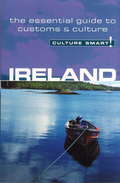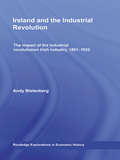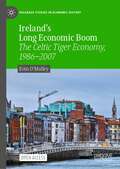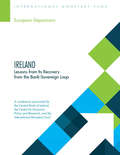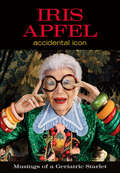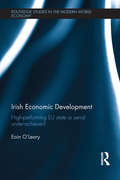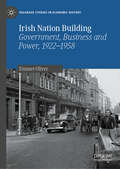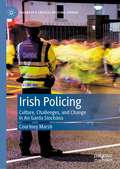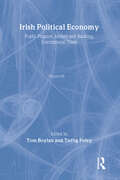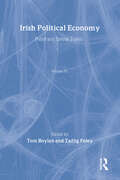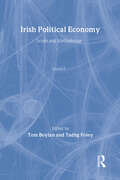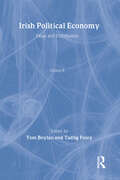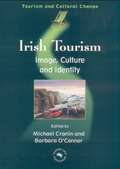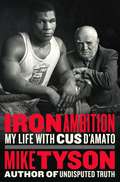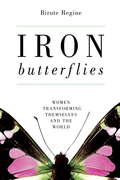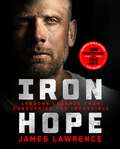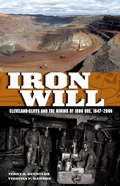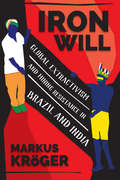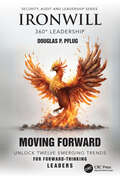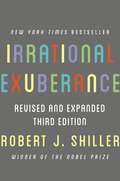- Table View
- List View
Ireland - Culture Smart!
by John ScotneyCulture Smart! provides essential information on attitudes, beliefs and behavior in different countries, ensuring that you arrive at your destination aware of basic manners, common courtesies, and sensitive issues. These concise guides tell you what to expect, how to behave, and how to establish a rapport with your hosts. This inside knowledge will enable you to steer clear of embarrassing gaffes and mistakes, feel confident in unfamiliar situations, and develop trust, friendships, and successful business relationships.Culture Smart! offers illuminating insights into the culture and society of a particular country. It will help you to turn your visit-whether on business or for pleasure-into a memorable and enriching experience. Contents include* customs, values, and traditions* historical, religious, and political background* life at home* leisure, social, and cultural life* eating and drinking* do's, don'ts, and taboos* business practices* communication, spoken and unspoken"Culture Smart has come to the rescue of hapless travellers." Sunday Times Travel"... the perfect introduction to the weird, wonderful and downright odd quirks and customs of various countries." Global Travel"...full of fascinating-as well as common-sense-tips to help you avoid embarrassing faux pas." Observer"...as useful as they are entertaining." Easyjet Magazine"...offer glimpses into the psyche of a faraway world." New York Times
Ireland and the Industrial Revolution: The impact of the industrial revolution on Irish industry, 1801-1922 (Routledge Explorations in Economic History)
by Andy BielenbergThis monograph provides the first comprehensive analysis of industrial development in Ireland and its impact on Irish society between 1801-1922. Studies of Irish industrial history to date have been regionally focused or industry specific. The book addresses this problem by bringing together the economic and social dimensions of Irish industrial history during the Union between Ireland and Great Britain. In this period, British economic and political influences on Ireland were all pervasive, particularly in the industrial sphere as a consequence of the British industrial revolution. By making the Irish industrial story more relevant to a wider national and international audience and by adopting a more multi-disciplinary approach which challenges many of the received wisdoms derived from narrow regional or single industry studies - this book will be of interest to economic historians across the globe as well as all those interested in Irish history more generally.
Ireland's Long Economic Boom: The Celtic Tiger Economy, 1986–2007 (Palgrave Studies in Economic History)
by Eoin O'MalleyThis Open Access book examines the long economic boom experienced in Ireland between the late 1980s and 2007, analysing why this boom occurred. The book situates Ireland as a relative latecomer to economic development, with specific challenges and advantages inherent to this position. It discusses the risks involved in remaining reliant on foreign companies, exploring how in Ireland’s case the rapidly growing economy required active, interventionist and imaginative policy measures rather than relying primarily on free market forces. The book also offers an estimation of the value of the net foreign earnings associated with different categories of exports after deducting the profit outflows and payments for imported inputs, revealing a number of findings about the importance of Irish indigenous companies and services during this time. It shows that Irish indigenous companies, assisted by industrial policy measures, played a significant part, as did the services sector,alongside the more visible and widely recognised role of foreign multinationals in high-tech manufacturing. Offering fresh insights and analyses more than 15 years after the long boom ended at the precipice of the global financial crisis, this book will be a useful resource for economic historians, scholars of political economy and macroeconomic policy, as well as those interested in modern Irish history more broadly.
Ireland: Lessons from Its Recovery from the Bank-Sovereign Loop
by International Monetary FundA report from the International Monetary Fund.
Irene Rosenfeld at Mondelez International: Crafting a Corporate Strategy
by David J. Collis Amram Migdal Kerry Herman Raffaella SadunThe case focuses on Irene Rosenfeld's tenure as CEO of the global snack food company Mondel z International. Beginning in 2006, she had led the company through many acquisitions, including France's LU Biscuit and British confectionery company Cadbury, before, in 2012, boldly splitting the company into two: Kraft, a North American grocery business, and Mondel z International, a global snack food company.
Irene Rosenfeld at Mondelēz International: Crafting a Corporate Strategy
by David J. Collis Amram Migdal Kerry Herman Raffaella SadunCase
Iridium LLC
by Benjamin C. Esty Fuaad A. Qureshi William OlsenThis case involves part of a module on financing large projects in the elective curriculum course entitled "Large-Scale Investment." It is set in August 1999, just after Iridium, a global communications firm, declared bankruptcy. Although the case describes Iridium's creation, development, and commercial launch, it concentrates primarily on the firm's financial strategy and execution as it raised more than $5 billion of capital. It describes the specific securities Iridium issued, the sequence in which it issued them, and the firm's financial performance prior to bankruptcy. Using analyst forecasts, students can value the firm prior to its bankruptcy, but will recognize how difficult it is to value technology start-ups given the uncertainty in demand.
Iris Apfel: Accidental Icon
by Iris ApfelFrom the fashion icon, “a joyous, colorful collection of photographs; drawings; reflections; and personal mottos on marriage, business, fame and style” (Boca Raton Observer).The late great Iris Apfel was a woman who transcended time and trends—one of the most original and dynamic personalities in the worlds of fashion, textiles, and interior design. Written a few years before her passing at age 102, this is a lavishly illustrated memoir in which she shares her musings, anecdotes, and incomparable wisdom.As the cofounder with her husband of Old World Weavers, an international textile manufacturing company that specialized in reproducing antique fabrics, she served a prestigious clientele including Greta Garbo, Estee Lauder, Montgomery Clift, and Joan Rivers. She also acted as a restoration consultant and replicated fabric for the White House over nine presidential administrations. Iris’s worldwide travels and devotion to flea markets inspired her work and fueled her passion for collecting fashion and accessories. In 2005, she was the first living person who was not a designer to have her clothing and accessories exhibited at the Costume Institute at the Metropolitan Museum of Art, a blockbuster show that catapulted her to fame and a career as a model, muse, and collaborator for renowned brands from Citroen to Tag Heuer. In 2015, acclaimed director Albert Maysles released Iris, his Emmy Award-nominated documentary, to a global audience.This celebratory volume captures her unique joie de vivre and features 180 full-color and black-and-white photos and illustrations—presented in the same improvisational, multifaceted style that made Iris a much-loved legend. “It’s hard to resist this self-proclaimed ‘geriatric starlet.’ With her owlish glasses, loud prints and necklaces upon necklaces, even in her 90s, Apfel is a fashion icon who combines a memoir with photos of the vibrant contents of her closets.” —The New York Times Book Review
Irish Economic Development: High-performing EU State or Serial Under-achiever? (Routledge Studies in the Modern World Economy)
by Eoin O'LearyThis book offers a discerning narrative on the spectacular rise and fall of the so-called Celtic Tiger economy. It depicts Ireland as a micro-state with a unique reliance on foreign-assisted businesses, driven in part by a favourable taxation regime. It shows that rent-seeking by trades unions and property developers contributed to the fall since 2002. Although the country’s highly centralized government’s pre-disposition to lobbying has yielded international successes, it has also resulted in recurring self-inflicted crises since 1970. This volume shows how Ireland’s export-led growth is associated more with the attraction of foreign-assisted businesses than with the development of critical masses of internationally competitive indigenous businesses. Although the success of foreign-assisted businesses in the pharmaceutical, ICT and finance sectors has been influenced by tax advantages, many of these businesses have been involved in highly productive activity in Ireland over a number of decades. The problem of rent-seeking is shown to have undermined Irish competitiveness in the internationally traded and sheltered sectors. The Irish policy mind-set is shown to lean towards distribution rather than growth. While this has been advantageous for how ‘Ireland Inc.’ interacts with other governments and international businesses, it has also resulted in a failure to resist the destructive effects of capture by lobbies. In conclusion, this book considers future opportunities offered by the EU’s smart-specialization policy and future threats from increased international tax competition. It argues that unless Irish citizens and policymakers change deep-seated attitudes and mind-sets towards business development, the country’s performance for the next number of decades will more likely resemble serial under-achievement than that of a high-performing EU state.
Irish Nation Building: Government, Business and Power, 1922–1958 (Palgrave Studies in Economic History)
by Emmet OliverThis book examines the early decades of economic nation building in Ireland. It draws on a large amount of previously unstudied archival material to construct a novel contribution to Irish business and economic history that focuses on government relations, business power and wider dynamics of power in a decolonising context. The book adopts a different approach to the early decades of Irish independence, decentering the typical focus on party political developments, Church-state relations and Anglo-Irish relations. Instead, the book explores the role of Irish businesses and services and their engagement with the governing elites of the time. More than just offering a general survey of Irish businesses in the early years of independence, the chapters of this book illuminate and analyse the ‘commanding heights’ of the economy, the Marxist term for the core distribution channels of capital and labour. In particular, the book focuses on four key strategic sectors – banking, insurance, shipping and rail – to analyse the tensions between the new Irish nationalist political elite and embedded business interests from the pre-independence era, how these led to the transformation of the Irish economic model by the late 1950s, and its gradual integration into a newly globalising world economy. This book will be essential reading for students and researchers of economic and business history, and Irish history and independence broadly.
Irish Policing: Culture, Challenges, and Change in An Garda Síochána (Palgrave's Critical Policing Studies)
by Courtney MarshThis book examines the organisational culture of the Irish police service, speaking in particular to those interested in policing organisations and organisational culture. It is set against a backdrop of considerations such as community policing, police accountability, the management of change in Irish policing, and where the Irish police situates itself in relation to police organisations internationally. An Garda Síochána, the national police service of the Republic of Ireland, has a stated community policing style which focuses on an interactive relationship with the community and results in a largely unarmed policing organisation which makes it different to most police organisations. Yet, the author argues that the organisational culture has prevented them from embodying community policing across the organisation. Exploring the organisation’s historical context and how they are trained, this book draws on new research and data spanning 30 years including tribunals and reports to examine the organisational culture over time including potential misconduct, blame culture, and resistance to change within the organisation, in order to provide a more thorough understanding of a relatively unknown policing organisation.
Irish Political Economy Vol 3
by Tom BoylanFirst published in 2004. This is a collection of carefully selected works and material, attempts to extend the current state of scholarship in the area of Irish Political Economy. The range and variety of material presented should be of interest not only to students of economic thought but also to those working in such fields as Irish Studies, history, politics, sociology and intellectual history. Volume 3 includes the area of public finance, Money and Banking; and International Trade.
Irish Political Economy Vol 4
by Tom BoylanFirst published in 2004. This is a collection of carefully selected works and material, attempts to extend the current state of scholarship in the area of Irish Political Economy. The range and variety of material presented should be of interest not only to students of economic thought but also to those working in such fields as Irish Studies, history, politics, sociology and intellectual history. Volume 4 includes the area of policy and special topics.
Irish Political Economy Vol1
by Tom BoylanFirst published in 2004. This is a collection of carefully selected works and material, attempts to extend the current state of scholarship in the area of Irish Political Economy. The range and variety of material presented should be of interest not only to students of economic thought but also to those working in such fields as Irish Studies, history, politics, sociology and intellectual history. Volume 1 includes the scope and methodology.
Irish Political Economy Vol2
by Tom BoylanFirst published in 2004. This is a collection of carefully selected works and material, attempts to extend the current state of scholarship in the area of Irish Political Economy. The range and variety of material presented should be of interest not only to students of economic thought but also to those working in such fields as Irish Studies, history, politics, sociology and intellectual history. Volume 2 includes the Value and Distribution.
Irish Tourism
by Barbara O'Connor Michael CroninFor many years Ireland has been a popular tourist destination and tourism has been one of the most significant social, economic and cultural forces in Irish society. Irish Tourism: Image, Culture and Identity engages with major national and international debates on contemporary tourism through cutting-edge research. The book explores the multi-faceted nature of this important phenomenon, drawing on current work in sociology, cultural studies, ethnography, and language studies. For those who theorise about tourism and those who make practical day-to-day decisions on tourism policy, Irish Tourism will provide invaluable insights into historical and contemporary tourist representations, practices and impacts. In addressing issues such as the relationship between the local and the global in tourist settings, the construction of tourist imagery and products, and the development of tourism policy, contributors to Irish Tourism offer an innovative and critical analysis of the impact of global tourism on a small country. This book will be indispensable reading for students and scholars in Tourism Studies and Irish Studies and will also be essential for students of sociology, cultural studies, geography, languages and anthropology.
Irizar in 2005
by Ramon Casadesus-Masanell Jordan MitchellIn June 2005, Koldo Saratxaga, the leader of Basque-based luxury coach manufacturer Irizar, decided to leave after 14 years at the helm of the worker-owned cooperative. Under Saratxaga's stewardship, Irizar was saved from near bankruptcy in 1991 and has become a highly profitable industry leader with a 23.9% compound annual growth rate since 1991. The company opened a number of manufacturing sites as far-reaching as Mexico, Morocco, India, Brazil, China, and South Africa. Irizar calls itself "a project based on people" and has realized its success through a business model characterized by a narrow product focus, strict quality adherence, an empowered workforce, and a truly customer-centric organization. Irizar's model is completely different from that of most other coach manufacturing firms given the absence of unions, departments, and hierarchy. All activities are carried out by self-managed teams (teams, for example, are responsible for setting their own work schedules and objectives). Although Irizar's model has worked fantastically well for over 14 years (since Sarataga's arrival), the question now is: Will the company continue to thrive without Saratxaga? Or is Irizar's success due to Saratxaga's leadership?
Iron Ambition: My Life with Cus D'Amato
by Larry Sloman Mike Tyson"[Iron Ambition] spells out D'Amato's techniques for building a champion from scratch." – Wall Street JournalFrom the former heavyweight champion and New York Times–bestselling author comes a powerful look at the life and leadership lessons of Cus D’Amato, the legendary boxing trainer and Mike Tyson’s surrogate father. When Cus D’Amato first saw thirteen-year-old Mike Tyson spar in the ring, he proclaimed, “That’s the heavyweight champion of the world.” D’Amato, who had previously managed the careers of world champions Floyd Patterson and José Torres, would go on to train the young Tyson and raise him as a son. D'Amato died a year before Tyson became the youngest heavyweight champion in history. In Tyson’s bestselling memoir Undisputed Truth, he recounted the role D’Amato played in his formative years, adopting him at age sixteen after his mother died and shaping him both physically and mentally after Tyson had spent years living in fear and poverty. In Iron Ambition, Tyson elaborates on the life lessons that D’Amato passed down to him, and reflects on how the trainer’s words of wisdom continue to resonate with him outside the ring. The book also chronicles Cus’s courageous fight against the mobsters who controlled boxing, revealing more than we’ve ever known about this singular cultural figure.
Iron Butterflies
by Birute RegineA profound transition is taking place in our society, a revolution that is largely hidden, and led predominantly by women. A society once based on domination and power over others is beginning to crumble as an era of cooperation and community emerges, founded on the principle that power should only be exercised with and for others. This is the inspiring, central message of this compelling narrative that weaves together the stories of sixty successful women from all walks of life and throughout the world. The author spent several years in eight countries interviewing these dynamic female role models: businesswomen, CEOs, a Congresswoman, a governor, an ex-Prime Minister, a Pulitzer Prize finalist, a Nobel Peace Prize laureate, a winemaker, artists, doctors, nurses, and many others. The author calls these women "Iron Butterflies" because they meld a will of iron with the gentle, nurturing touch of a butterfly. With disarming candor, these women talk about their struggles, their fallibilities, and their strengths in the journey to the top of their professions. Forging their leadership from an amalgam of masculine and feminine skills, all of these Iron Butterflies have transformed themselves and in doing so they are contributing to a larger social transformation. A key to this personal and social transformation rests in their ability to address vulnerability in themselves and those around them, and transform it into a crucible of healing, growth, and innovation. Knowing how to deal with vulnerability, in ourselves and with others, evokes feminine skills and values and is a key to the societal change so many are seeking. Critiquing the command-and-control style of leadership, derived from the gladiator concept of male invulnerability, the author convincingly demonstrates how traditional feminine skills and values--such as inclusion, empathy, a holistic perspective, relational skills, and emotional strength--can be applied to empower more people than ever before. Like the sixty Iron Butterflies profiled, leaders in the 21st century will paradoxically embrace vulnerability and durability, creating better working and living relationships for us all.
Iron Hope: Lessons Learned from Conquering the Impossible
by James LawrenceThe ultimate guide to mental toughness by James “Iron Cowboy” Lawrence—the greatest endurance athlete in human history.Lawrence’s accomplishments are nearly impossible to comprehend. After breaking two Guinness World Records, he shattered possibilities in 2015 by completing 50 full-distance triathlons in 50 states in 50 consecutive days. Yes, THE IRONMAN®, “the single most difficult day in sports”– a 2.4-mile swim, 112 miles on a bike, then a 26.2-mile run, all completed in under 17 hours. It is a race so intense that less than .01% of the population have completed one.Afterwards, Lawrence subjected his body to exhaustive physical testing, to every genetic test known to science. The stunning discovery is that physically, James Lawrence is unspecial in every way. The secret to his bulletproof body is his bulletproof mentality.Even those accomplishments weren’t enough for James. In 2021, he set out on another endurance endeavor, this one so difficult he wondered if he would even live. He set out to complete a staggering 100 full-distance triathlons in 100 consecutive days. By persevering, he wanted to inspire people to do the same for whatever difficulties they are going through.How does a person develop the mental fortitude necessary to overcome incredible exhaustion, immeasurable suffering, and unfathomable pain in order to achieve impossible goals? With Iron Hope, that’s exactly what James “Iron Cowboy” Lawrence shows readers how to do. Lawrence explains how readers can forge an iron will by making and keeping small promises to themselves again and again, amassing experience and building momentum until giving up becomes impossible. Combine a big dream with small improvements repeated with great consistency and make your goals and dreams a reality.
Iron Will: Cleveland-Cliffs and the Mining of Iron Ore, 1847-2006
by Virginia P. Dawson Terry S. ReynoldsThe history of Cleveland-Cliffs, a company that played a key role in iron mining development in the Lake Superior region.
Iron Will: Global Extractivism and Mining Resistance in Brazil and India
by Markus KrögerIron Will lays bare the role of extractivist policies and efforts to resist these policies through a deep ethnographic exploration of globally important iron ore mining in Brazil and India. Markus Kröger addresses resistance strategies to extractivism and tracks their success, or lack thereof, through a comparison of peaceful and armed resource conflicts, explaining how different means of resistance arise. Using the distinctly different contexts and political systems of Brazil and India highlights the importance of local context for resistance. For example, if there is an armed conflict at a planned mining site, how does this influence the possibility to use peaceful resistance strategies? To answer such questions, Kröger assesses the inter-relations of contentious, electoral, institutional, judicial, and private politics that surround conflicts and interactions, offering a new theoretical framework of “investment politics” that can be applied generally by scholars and students of social movements, environmental studies, and political economy, and even more broadly in Social Scientific and Environmental Policy research. By drawing on a detailed field research and other sources, this book explains precisely which resistance strategies are able to influence both political and economic outcomes. Kröger expands the focus of traditionally Latin American extractivism research to other contexts such as India and the growing extractivist movement in the Global North. In addition, as the book is a multi-sited political ethnography, it will appeal to sociologists, political scientists, anthropologists, geographers, and others using field research among other methods to understand globalization and global political interactions. It is the most comprehensive book on the political economy and ecology of iron ore and steel. This is astonishing, given the fact that iron ore is the second-most important commodity in the world after oil.
Ironwill 360° Leadership: Moving Forward: Unlock Twelve Emerging Trends for Forward-Thinking Leaders (Security, Audit and Leadership Series)
by Douglas P. PflugIronwill 360° Leadership: Moving Forward by Douglas Pflug is a captivating journey into the future of leadership in 2025 and beyond, tailored for forward-thinking visionary leaders hungry for success.Prepare yourself for twelve game-changing trends, from mastering Digital Mindfulness to igniting Purpose-Driven Leadership. Pflug's insights on Remote Leadership Skills, Adaptive Learning, and Inclusive Leadership are your secret weapons for navigating today's dynamic world.Dive into Resilience, Ensuring Sustainability, and Human-Centric Leadership to discover the roadmap to survive and thrive. Uncover the delicate dance between AI and EQ, unlock the power of collaboration, and master the art of Nurturing Collaborative Leadership for sustained success.But that's not all—Pflug goes beyond boundaries, introducing Holistic Spirituality and redefining ethical leadership with a universal touch. In a compelling call to action, the book challenges you to be a force for positive change through service, charity, and philanthropy.Ironwill 360° Leadership isn't just a guide; it's your ticket to transforming leadership into a powerful legacy that resonates with impact and purpose.Get ready to lead with Ironwill 360° Leadership—the future starts now!Are you prepared to answer the call to action?!GET READY TO LEAD WITH IRONWILL 360° LEADERSHIP—THE FUTURE STARTS NOW!ARE YOU PREPARED TO ANSWER THE CALL TO ACTION?!For more information about Doug or details on his book Finding Your Granite: My Four Cornerstones of Personal Leadership, please visit www.RiseUpAndExcel.ca.
Irrational Exuberance in the U.S. Housing Market: Were Evangelicals Left Behind?
by Christopher CroweA report from the International Monetary Fund.
Irrational Exuberance: Revised and Expanded Third Edition
by Robert J. ShillerWhy the irrational exuberance of investors hasn't disappeared since the financial crisisIn this revised, updated, and expanded edition of his New York Times bestseller, Nobel Prize–winning economist Robert Shiller, who warned of both the tech and housing bubbles, cautions that signs of irrational exuberance among investors have only increased since the 2008–9 financial crisis. With high stock and bond prices and the rising cost of housing, the post-subprime boom may well turn out to be another illustration of Shiller's influential argument that psychologically driven volatility is an inherent characteristic of all asset markets. In other words, Irrational Exuberance is as relevant as ever. Previous editions covered the stock and housing markets—and famously predicted their crashes. This edition expands its coverage to include the bond market, so that the book now addresses all of the major investment markets. It also includes updated data throughout, as well as Shiller's 2013 Nobel Prize lecture, which places the book in broader context. In addition to diagnosing the causes of asset bubbles, Irrational Exuberance recommends urgent policy changes to lessen their likelihood and severity—and suggests ways that individuals can decrease their risk before the next bubble bursts. No one whose future depends on a retirement account, a house, or other investments can afford not to read this book.
